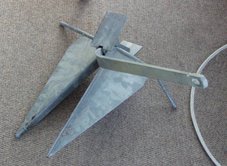Every autumn, boaters in cold climates take part in a ritual called "Hauling Out and Winterizing". It's the time of year when boaters blink back the tears associated with knowing there's a long hard winter ahead and stumble through the routine of fortifying their beloved boat against the cold wet miserable climate in which they choose to live.
Or, maybe those tears are simply because they got the winterizing bill from the yard.
You see, I don't think I know anyone who does the winterizing themselves. I walk across the boatyard and see scores of boats. But no owners. Only yard workers.
Yet, every autumn the boating world is awash with how-to-winterize information. Articles cover the pages of boating magazines. Signs plaster the aisles and windows of local marine stores. And posts clog the internet discussion groups.
And I'm pretty sure no one in a boat larger than 30 feet does it. Sure, we read that info, and even give out advice and views of our own about it. Then we pay the yard to do it for us. Why is that? Well, it's certainly not because we're all filthy rich. Having a boat pretty much takes care of that problem. No, I'm convinced people look at those "how-to" lists, think about the complex (and expensive) systems on their boats, then come to the conclusion that "I'll let the yard handle it so if something isn't properly winterized it won't be
my fault."
But batteries . . . now batteries are different. Especially the standard wet cell kind. Just unhook 'em, isolate 'em and give 'em a charge every now and then.
Yeah, they say you should take them off the boat but, really, who's gonna lug those heavy things out of the engine room, down a 10 foot ladder, into the back of a car, then into their home where they can spill battery acid on valuable belongings (and get yelled at by the admiral - again), while attempting to maintain a proper charge?
No, I just leave them on the boat and charge them every now and then. It always works just fine, and in the spring the boat fires right up as though the batteries are brand new.
If you're gonna follow this procedure, here's the general rule: NEVER MIX OLD BATTERIES WITH NEW ONES IN THE SAME BATTERY BANK.
We've all heard it, and we all understand it. A bad battery will drain the good ones and then you'll have one big dead battery bank.
This year, I got lazy and didn't disconnect the batteries from the charger - or each other. I have two banks, one for starting and one for house. I just left both banks hooked to the charger, with the battery switches set to "both". That way, I can go to the yard at my convenience, plug a power cord from the boat into one of their outlets, and give the batteries some juice every now and then. I don't even have to go into the engine room and access the batteries.
Sounds like a great deal until just one battery goes bad. I went to the boat the other day and was surprised to find everything was dead. Sure enough, the starting battery, which is the oldest of the bunch, finally died. Since all batteries were effectively connected to each other, it drained the house batteries as well. I've since disconnected it and recharged the house batteries.
But I broke the simple rule on battery maintenance. The one thing I
didn't pay the yard to do. Sigh. It may not have damaged the other batteries, but it sure didn't do them any good. I'll see how well they hold a charge in the future.
So . . . don't be like me! Disconnect those batteries from each other in the winter! Or, come spring, you'll have much more "commissioning" work to do.
(
Commisioning is a traditional nautical term that means "pay the yard lots of money to put your boat in the water")


